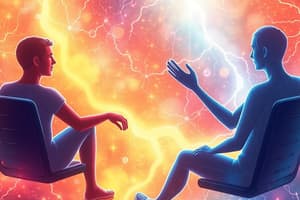Podcast
Questions and Answers
Which of the following best describes the primary mechanism of action for centrally acting muscle relaxants?
Which of the following best describes the primary mechanism of action for centrally acting muscle relaxants?
- Blocking pain receptors in the brain to alleviate discomfort associated with muscle conditions.
- Increasing the release of acetylcholine in the peripheral nervous system.
- Directly relaxing skeletal muscles at the neuromuscular junction.
- Interfering with the reflexes in the central nervous system to reduce muscle spasm. (correct)
A patient with a history of which condition would be most likely to have a contraindication to centrally acting muscle relaxants?
A patient with a history of which condition would be most likely to have a contraindication to centrally acting muscle relaxants?
- Osteoporosis
- Epilepsy (correct)
- Hypertension
- Diabetes
What is the most common intended therapeutic effect of centrally acting muscle relaxants?
What is the most common intended therapeutic effect of centrally acting muscle relaxants?
- Improving cardiovascular function
- Increasing muscle strength
- Relieving discomfort from acute musculoskeletal conditions (correct)
- Reducing inflammation
Which of the following adverse effects is most likely to be associated with centrally acting muscle relaxants?
Which of the following adverse effects is most likely to be associated with centrally acting muscle relaxants?
Why is it important to avoid the concurrent use of alcohol and centrally acting muscle relaxants?
Why is it important to avoid the concurrent use of alcohol and centrally acting muscle relaxants?
A patient taking a centrally acting muscle relaxant reports feeling dizzy upon standing. What is the most likely cause of this?
A patient taking a centrally acting muscle relaxant reports feeling dizzy upon standing. What is the most likely cause of this?
Centrally acting muscle relaxants should be avoided in patients experiencing spasms resulting from what condition?
Centrally acting muscle relaxants should be avoided in patients experiencing spasms resulting from what condition?
Which of the following conditions represents a major contraindication for the use of centrally acting muscle relaxants due to potential adverse effects?
Which of the following conditions represents a major contraindication for the use of centrally acting muscle relaxants due to potential adverse effects?
Concurrent use of MAOIs (Monoamine Oxidase Inhibitors) with centrally acting muscle relaxants should be approached with caution because of the increased risk of what?
Concurrent use of MAOIs (Monoamine Oxidase Inhibitors) with centrally acting muscle relaxants should be approached with caution because of the increased risk of what?
Which of the following best explains why pregnancy is listed as a contraindication for centrally acting muscle relaxants?
Which of the following best explains why pregnancy is listed as a contraindication for centrally acting muscle relaxants?
Flashcards
Centrally Acting Relaxants
Centrally Acting Relaxants
Works in the CNS to interfere with the reflexes causing muscle spasm.
Examples of Muscle Relaxants
Examples of Muscle Relaxants
Baclofen, carisoprodol, methocarbamol, cyclobenzaprine, tizanidine, chlorzoxazone.
Indications for Use
Indications for Use
Relief of discomfort associated with acute, painful musculoskeletal conditions.
Contraindication of Muscle Relaxants
Contraindication of Muscle Relaxants
Signup and view all the flashcards
Contraindications
Contraindications
Signup and view all the flashcards
Adverse Effects
Adverse Effects
Signup and view all the flashcards
Drug-Drug Interactions
Drug-Drug Interactions
Signup and view all the flashcards
Study Notes
- Centrally acting muscle relaxants work in the CNS to interfere with reflexes causing muscle spasm
Names
- Baclofen
- Carisoprodol
- Methocarbamol
- Cyclobenzaprine
- Tizanidine
- Chlorzoxazone
Indications
- Provides relief of discomfort associated with acute, painful musculoskeletal conditions
Contraindication
- Spasms resulting from rheumatic disorders
Contraindications
- Epilepsy
- Cardiac dysfunction
- Hepatic or renal dysfunction
- Pregnancy and lactation
Adverse Effects
- CNS depressant
- Hypotension
- Dyspnea
- Dizziness
- Altered mental status
- Hepatic dysfunction
Drug-Drug
- Alcohol
- MAOIs
- Antihistamines
- Other CNS depressants
Studying That Suits You
Use AI to generate personalized quizzes and flashcards to suit your learning preferences.


